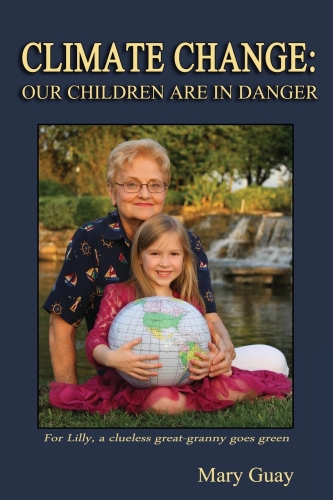

| CLIMATE CHANGE: Our Children Are in Danger Mary Guay LaBelle, FL: Big Lake Press, January 2014 |
Rating: 5.0 High |
|||
| ISBN-13 978-1-4947-3360-5 | ||||
| ISBN-10 1-4947-3360-9 | 322pp. | SC/GSI | $14.95 | |
Three things awakened Mary Guay to the urgency of the global problem of climate change. One was the facts she found in Harmony, a 2010 book by Britain's Prince Charles. The second was the month she and her husband spent on the island of Roatan, which brought home the contrast between today's world and the world she knew in her childhood. But in the final analysis, the retired hospice worker was inspired to write this book by her great-granddaughter Lilly — or rather by understanding what sort of world Lilly might inhabit if present trends continue.
"Lilly is a happy, healthy, and well-loved little girl. Seven years after that beautiful birth and my vow to keep her from harm, I am writing this book to inspire others to join in a movement to save the Earth. I offer information, insight, many hands-on things you can do, and motivation to inspire action, so that future generations are able to live in a world capable of sustaining our loved ones as they grow." – Page 18 |
This is, in short, the testimony of an ordinary woman (insofar as anyone who comforts the dying on a regular basis can be called ordinary) waking up to the seriousness of a problem and making the choice to confront it, rather than deciding it's too big to face, or that it's somebody else's problem.
Indeed it is everyone's problem. The changes global warming brings are already afflicting many people. In years to come they will arrive on the doorsteps of many more. It is possible that a few now living may avoid all harm; but such pervasive changes make this a remote possibility. In any case, those who face the greatest risk are future generations. It is they who must deal with sea levels risen not just a few inches, but a few feet; with droughts and floods and storms and heat waves grown more frequent and severe; with the food shortages and waves of desperate refugees that result.
We can, of course, decide that future generations must fend for themselves; that they will, after all, be richer and more numerous, thus better able to cope with whatever befalls them. But these are mere assumptions — and extremely shaky ones given the findings of scientists and economists. And even if there was a modicum of support for them, the idea that the present generation would abandon its descendants to the vagaries of fate effectively revokes its claim on the designation "human".
The plain fact is that putting off dealing with climate change is going to cost far more in the long run. Mary Guay understands this clearly. She understands the harms that climate change will bring in the future. She understands that it is already causing harm. And she understands the reasons that effective actions have been delayed for so long.
Mary Guay is not a professional writer, and she makes no claim to be one. So much the better. She presents here the record of her own search — a search that led her through books, magazines, video documentaries, and interviews. Along the way she discovered many unpleasant facts and a good number of personal solutions. It is true that personal actions will not solve the whole problem themselves. Nevertheless, they can make a big impact and should not be discounted.1 Also, everyone who decides to take personal action is another citizen who understands the need for government action.
"Saudi Arabia's largest oil field, Ghawar, is far beyond peak; they now get as much water as oil from the wells. Mexico's Cantarelle Super Oil Field is nearly drained. Of the world's sixty-five largest oil producing countries, fifty-nine of them have oil production that has leveled off or is in decline as of 2008. At the same time, the demand for oil is expected to climb by 40%. Many countries are scraping the bottom of their oil fields. We buy oil from countries we might have problems with in the future. The prospect of funding more oil wars seems like an expense we need to avoid." – Pages 114-115 |
The book lays out the facts in clear and sometimes scathing prose: climate science, fossil fuels and renewable energy, land use; water; food; and government coverups. There are some mistakes, both factual and grammatical. I list these in an errata page as usual. But Mary gets the essentials right. I give her book top marks and consider it a must-read. And, as she does, I suggest that you pass your copy along after you've read it. Her message — that we've delayed too long but that it's not too late — needs to reach as many people as possible, ASAP.
I'll close with some choice quotations from page 266 of the book.
"Washington, DC, state and local governments, where is your leadership and why aren't you trying to save us?"
"You can interpret that as directed to the power elite or to everyone; I support both views. However, I am trying to take my name and address off the list."
Let's all take our names and addresses off the list.

 To contact Chris Winter, send email to this address.
To contact Chris Winter, send email to this address.